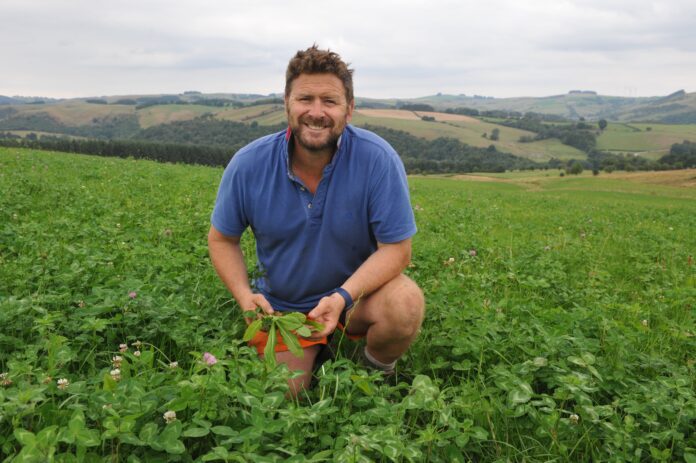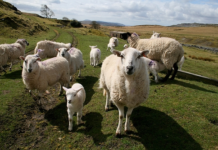Welsh farms are losing 5t/acre of soil every time the thickness equivalent of a one-pence coin is eroded from fields left bare in the winter.
“That soil isn’t replaced, and that’s your livelihoods being washed away; you need to keep that resource on your farm,” forage and grassland specialist Charlie Morgan warned farmers attending an open day at Dolygarn, a Farming Connect Demonstration Site at Llanbadarn Fynydd, Powys.
Mr Morgan has been advising livestock farmer James Powell with reseeding decisions at Dolygarn through the farm’s project work with Farming Connect.
Mr Powell has switched from growing winter grazing crops of stubble turnips and rape for his sheep to sowing a rape, Italian ryegrass and berseem clover mixture (Clampsaver II), which not only provides autumn/winter forage for finishing lambs, but grazing in the spring and a silage crop.
This grass-based crop has the ability to ‘anchor’ the soil, to reduce soil and nutrient run-off. It also allowed Mr Powell to double his income from lamb sales. He produced 7,843kg of lamb on 4.7ha, returning £16,845 in sales, compared to 3,500kg of lamb worth £7,500 from a comparable acreage of stubble turnip and forage rape.
Earthworm count in the soil hosting the Clampsaver was 50% higher than in the brassica field. It was followed in the rotation by a permanent ley of Highlander, a long-term mix formulated for upland farms, with additional herbs and red clover; this has transformed soils and feed availability.
Using filtration equipment simulating an inch of rainfall an hour (similar to what might occur during a thunderstorm), Mr Morgan showed farmers how, by improving the soil profile, it was now better able to absorb water – not only preventing flooding of towns and communities at lower levels, but holding onto that water to allow its use by plants during times of drought.
“Soil will hold water reserves and, through a combination of capillary action and growing the right type of multi-species leys, provide grazing during the exceptionally dry conditions we have seen this year,” he said.
The Highlander ley was grown without any artificial fertiliser – only manure generated by the pigs contract-reared at Dolygarn.
Mr Powell is also using trees to protect soils and provide shelter belts for his stock. Shelter belts planted at the farm in the 1970s have now matured, and are being felled for timber, providing income for the business. They will be replaced with planting schemes that are 50% conifers and 50% native broadleaf species.
Geraint Jones, Farming Connect forestry officer, who has been advising on the project, said the hot and sunny summer had highlighted how important shelter was on livestock farms. Ahead of new financial incentives for tree planting in Wales’ Sustainable Farming Scheme, Mr Jones recommends that farmers earmark areas where stock are vulnerable to weather extremes.
He suggests trees should be integrated on a farm to work for that farm’s farming system, making use of their multifunctional benefits, from sequestering carbon and increasing biodiversity, to improving water quality and benefiting animal health and welfare.
Hedging trees also have an important role to play in farm biosecurity.
“By establishing a good boundary, you will prevent the transference of diseases like scab and lice in sheep, which can occur when they rub against fences, and avoid cattle touching nose to nose,” Mr Jones told farmers at the event.
Trees will be an important part of the financial calculations on farms going forward, he added.
“Now that trees are at the top of the climate change agenda, and business efficiencies sought after, tree planting is a financially viable option.”
Farming Connect is delivered by Menter a Busnes and Lantra Wales and funded by the Welsh Government and the European Agricultural Fund for Rural Development.
Help keep news FREE for our readers
Supporting your local community newspaper/online news outlet is crucial now more than ever. If you believe in independent journalism, then consider making a valuable contribution by making a one-time or monthly donation. We operate in rural areas where providing unbiased news can be challenging. Read More About Supporting The West Wales Chronicle
























